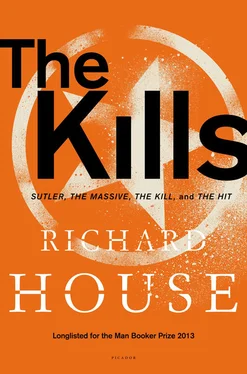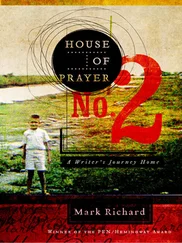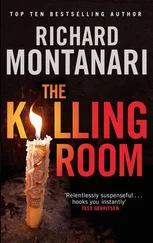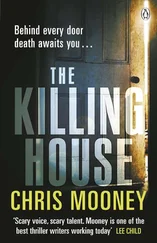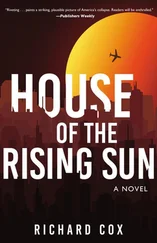His ambition remained the same. Once he hit Turkey he would head for Cukurca, a small town fifteen miles north of the border. He would find a hotel, a hostel, wait out until he was sure he was secure, then find a bank and transfer the money out of the junk account. He would return to Bonn, give up his apartment, pay his debts, sell what he owned, send the money back to England. Living in a small cabin for six weeks had taught him what he did and did not need. His life would become simple, lived day to day with modest self-sufficiency. He would almost certainly leave Europe. The moment this money was secured he’d leave the Middle East and never return. The attack on Southern-CIPA was a hard lesson, separate from his arrangement with Geezler, that life could change in one instant. In his backpack: two hundred and fifty-three American dollars, one litre of water. Not much of a plan, but a plan nevertheless. Among the flecks of sand Ford found a piece of seashell. He took the shell in one hand and tested his fingers, pressed the shard into the skin to gauge the loss of sensation, and thought that this was improving now the blisters were gone and the cuts were largely healed; although he could not yet feel heat or wetness, he could sense pressure. And while he considered how far he was from any ocean, he fell asleep, slipped from one world to another as a man falling backward through a window. In his dream debris flew about him as a tranquil sky turned black. Among the scattering dust: a window joist, paper, his boots flung hard and far, a man diving in a perfect arc, his clothes on fire.
* * *
He woke to the sound of approaching aircraft, with pins and needles running from his fingers through his forearm. Above him the sky sang with the drone of engines, a busy vibration of many unseen craft. Too exhausted to walk, he slept curled about a boulder. An hour later he woke again, as a single fighter tore over, and so it continued through the night with troop carriers, bombers, jets laden with menace, passing above the low-lying clouds. In the distance the blistering sound of gunfire, too regular to signal combat. At night these nations spoke in coded rumbles, one to the other, in whispers and threats.
* * *
He cowered until daylight and woke sensing that he was alone — the goat, and his ridiculous idea to kill it, gone. Unable to escape the mist that settled about the slope he headed downhill but never seemed free of the mountain or the cloud salted with grit. When the ground levelled he followed a track of compacted stone out of a ravine to emerge in a lowland fen of grasses and marsh and open blue sky. Beside the road, in ditches and clearings, lay abandoned hideouts with military camouflage, stacked sandbags slopped with mud. Above him, strung across the mouth of the gulley, hung a Turkish flag, blood-red, immense.
2.2
A message to call the London office of Gibson & Baker arrived in the early morning, as an email with an attachment, which he picked up on his phone; the subject line marked URGENT: Call Gibson ASAP. Parson ignored the request. The word urgent worked an irritation in him. A little insulted that the message showed no sensitivity, to how busy he might be, Parson pocketed the phone and started his day. Gibson’s desire to have his staff available at any hour needed disciplining, and he wouldn’t call. Not immediately.
Later in the morning, out in the desert with a tape measure, a camera, a notebook, Parson clambered up a littered shale bank to reach the road, and remembered the message, and thought that he was foolish not to pay it immediate attention. He should have called London, he should have spoken with Gibson, exactly as he was asked. He returned to the vehicle and finished his notes, marked measurements on a diagram of the road — a simple line with a single curve. The road, straight for fifty-three miles, rose on a slight embankment as it turned, then levelled out again and continued through the desert for another thirty-two straight miles. A highway with almost no traffic, and a turn which accounted for a good number of fatalities. Even here, thirty-two miles south of the closest town, the roadside appeared untrustworthy. The siding was indistinct, an embankment of boulders and stones furred with shredded paper and plastic that rattled in the wind. A thick border of potential hazard, which might contain any kind of mess, hide any kind of device.
He took photographs of the tread marks on the road, took shots of the highway, almost of nothing, the sky and land being of equal value, bright and burnt, without particular feature. He braced against the wind to take another photograph of the curve, then returned to the vehicle to write down the details. Seven weeks ago a HOSCO supply truck had missed the turn and careened off the road, blindly launched itself over the drop, a mere three feet: small, but stepped high enough to tip the vehicle to its side before it hit the scree. Pieces from the supply truck could be found without effort, fragments of glass and sections from the frame, rutted aluminium, some pieces of chrome that caught the sun, and as he picked through the debris field Parson re-read the case files. The marks from this incident were hard to distinguish from other marks from other accidents, a history in scorched dirt of drivers falling asleep or just altogether missing the turn and finding themselves, for one moment, mid-air and roadless. HOSCO convoys used the road when security alerts made Highway 80 impassable. Parson never lost sight of the small ironies that made up his work. By seeking a safer route the convoy had come across more predictable enemies — exhaustion, fatigue, inattention — and a translator slumbering in the cabin of the tumbling truck was thrown from the bunk at the back of the cab to the windscreen and broke his neck.
He knew nothing about the translator, Amer Hassan, except that he held a British passport, and had a wife and two children in Darlington, UK. He knew that HOSCO had already terminated the contracts of its American and European drivers and rehired men from Nepal, India, and Sri Lanka. He knew that most of the translators came from Baghdad or the northern cities, and that they would not be able to return home because of their work.
The soldier escorting Parson (one of two, the second behind the vehicle), picked at a hair in his nose, and asked if Parson was ready. Small-talk done between them, Parson nodded and put away his work. He disliked travelling in the HOSCO jeeps, and disliked passing through the small towns. He disliked how men watched, heads turning as the truck drove by, some rooted calculation in their minds. He disliked the trash by the roadside, the dogs, the children who sometimes ran after them, the plumes of roadside fires spiralling into flat blue skies. He disliked the dust, the flies, the heat, the sweat, the way he thought these days of them and us. He disliked how he could be miles from anywhere, cutting through the desert on some unbending road, and how he would still see plastic bags or water bottles, or clothes. He disliked every moment he spent outside the camp compound, but these visits were unavoidable, so he conducted them as precisely as possible, as early in the day as he could arrange.
* * *
Back on base in a hut that passed for guest quarters, Parson laid out the case files. An accident. Simple enough, a ranking of ‘no culpability’ with ‘mitigating circumstances’, which he trusted HOSCO would translate sympathetically. He sat with a bottle of tepid water. It bothered him to be resolving issues in the field which could be decided in a comfortable office in London that faced the river and the Temple, with plain views of temperate browns and greys, of occasional river traffic and pedestrians, a welcome dullness to the prospect and the work. In London he would argue the matter.
Читать дальше
